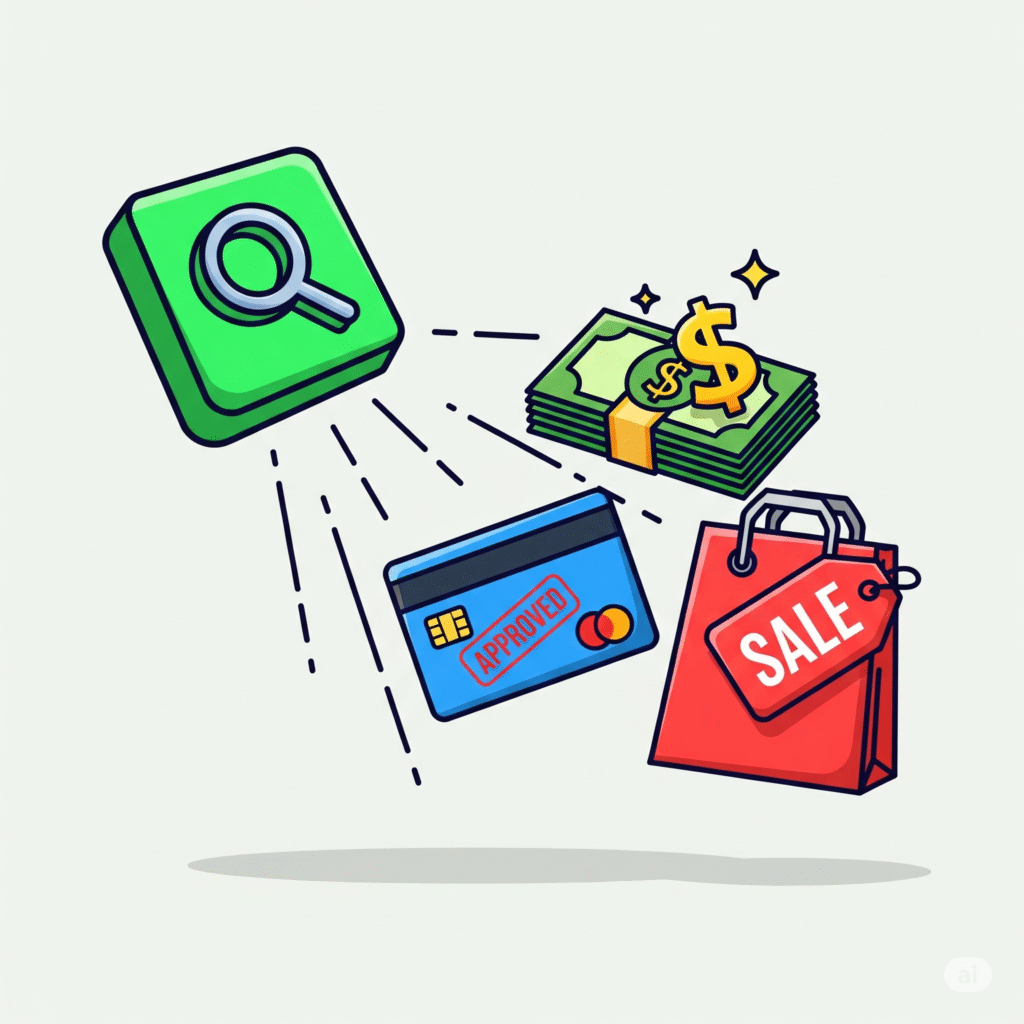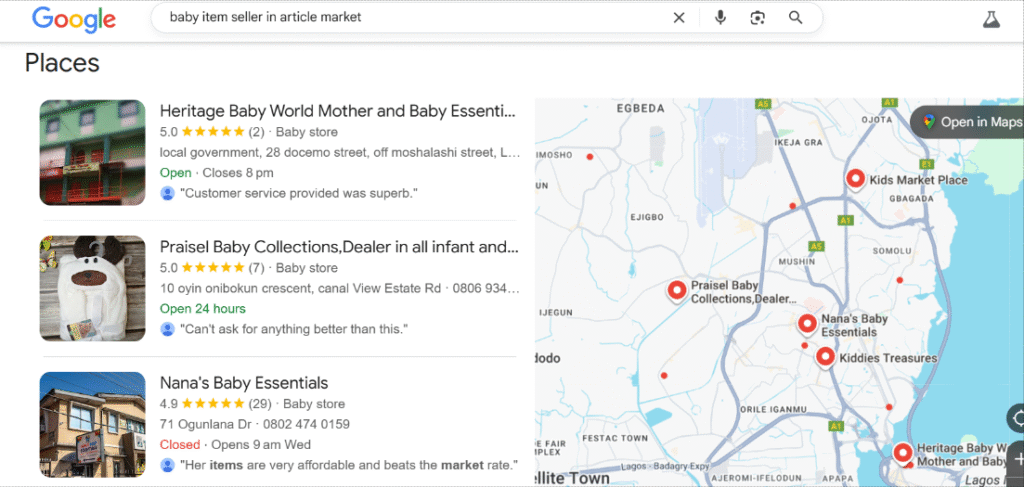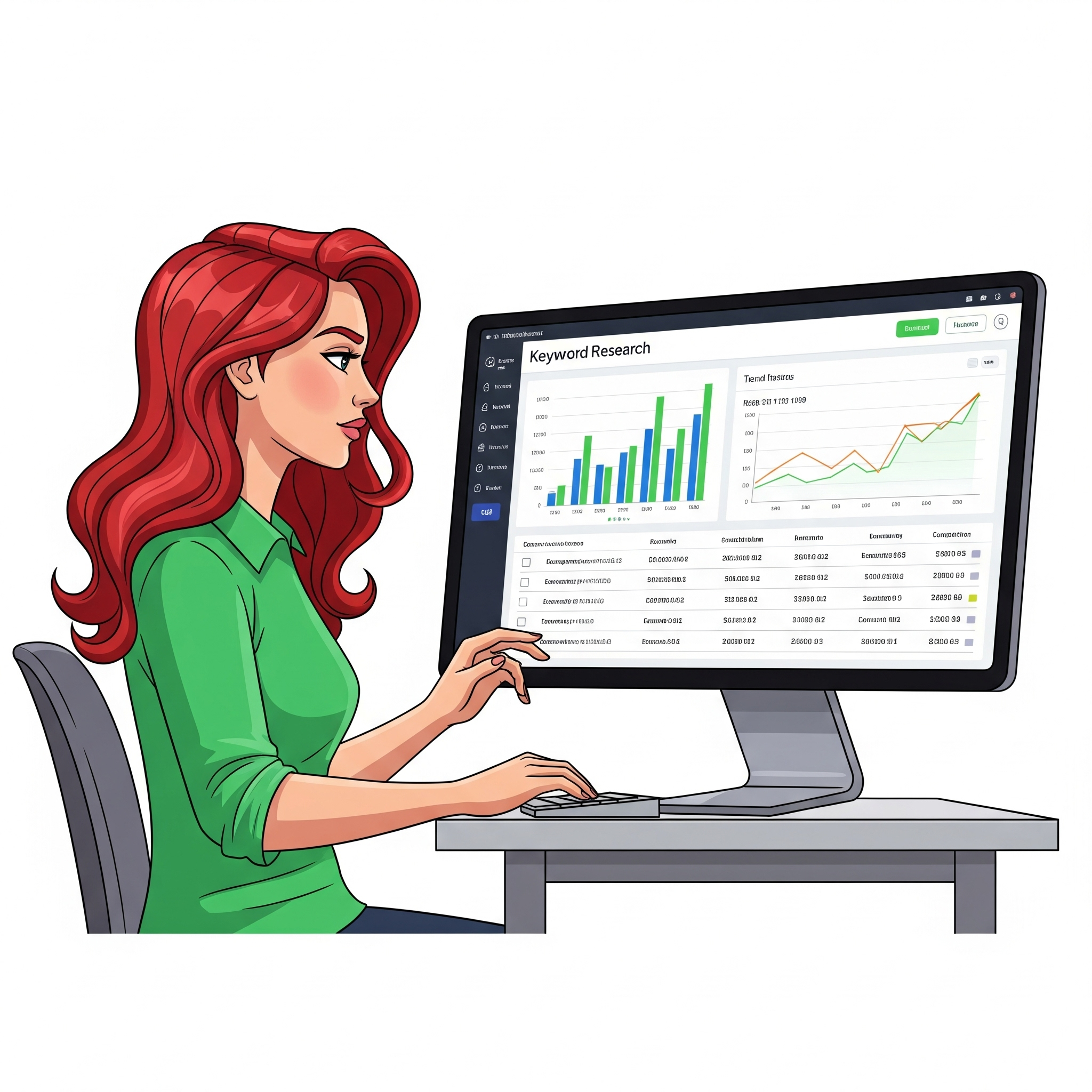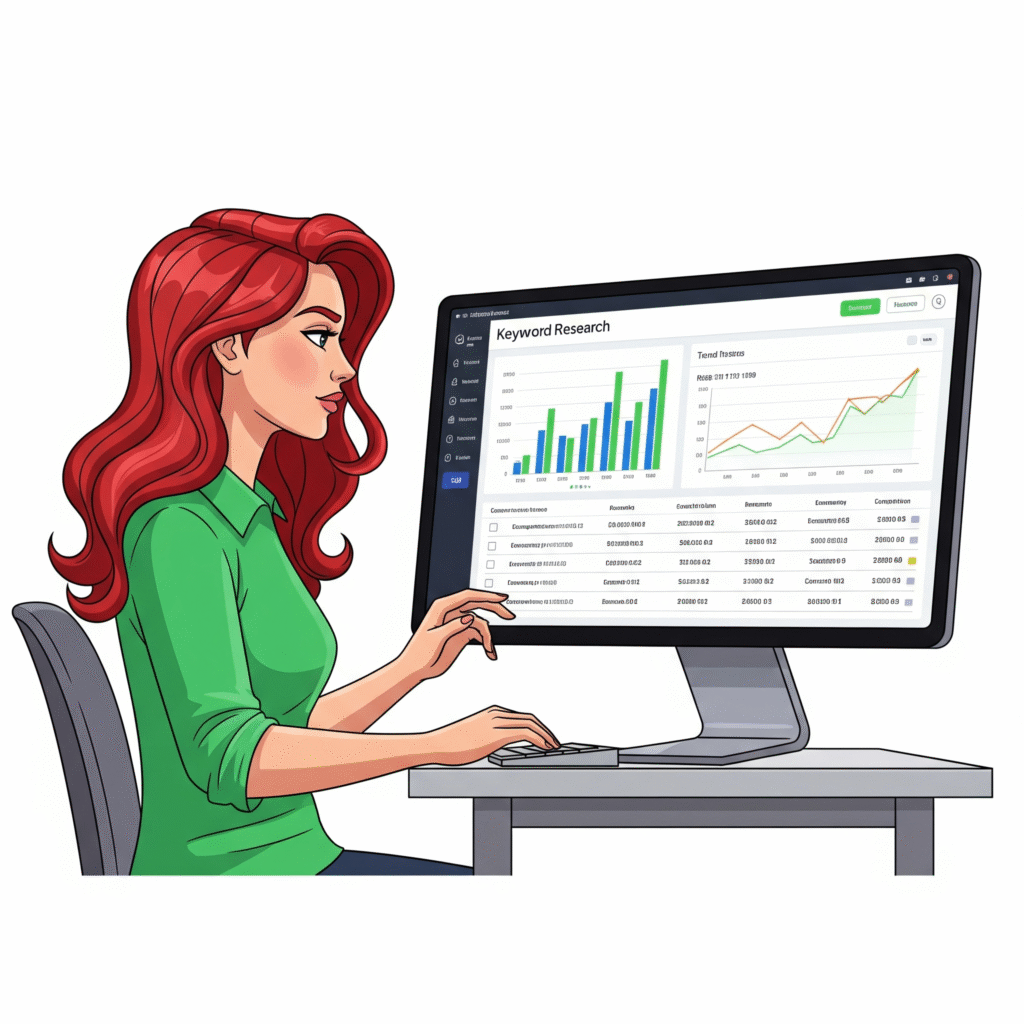
Back in 2024, I was pregnant and on 100% bed rest. Stepping out to shop for baby items was not an option, so what did I do? I turned to Google! I searched for “Baby item sellers in Article Market,” which is a market close to my home in Lagos. After browsing through a few business listings, I found one that caught my eye. I ended up spending over ₦400,000 with this vendor, and I still occasionally order from her today. And she isn’t the only business I’ve discovered and purchased from through a Google search.
What made me choose her out of all the other businesses? She didn’t even have a website! But she was discoverable on Google, and her business profile was well-optimized.
This is the power of local SEO, and it’s a tool that many small business owners in Nigeria are still sleeping on. If you’re reading this, consider yourself lucky because the information I’m about to share will give you a 10x advantage over your competitors. I’ve simplified this post into a five-point checklist of actionable steps you can take right now to drive organic sales for your business, even if you don’t have a website.
The Difference Between Global and Local Search
Before we dive in, let’s quickly differentiate between global and local search.
- Global Search: This is what most people think of when they talk about SEO. It’s about ranking for broad, non-location-specific keywords like “digital marketing” or “best phone.” The competition is fierce, and it’s almost impossible for a small business to rank globally without a huge budget and a dedicated team.
- Local Search: This is where you, as a small business owner, can dominate. Local search is all about showing up for location-based queries, like “baby item sellers in Article Market,” “mechanic near me,” or “best restaurant in Ikeja.” Google prioritizes businesses in a specific area, making it a much more level playing field. And this is exactly what we’ll be focusing on.
Now, let’s get into the checklist!
5 SEO Checklists to Drive Organic Sales for Your Business
1. Your Google Business Profile is Your Digital Storefront
Your Google Business Profile (formerly Google My Business) is the single most important tool for local SEO. Think of it as your free, digital storefront that Google provides. When a potential customer searches for a business like yours, your GBP is what shows up, complete with your address, phone number, hours, and reviews.

Here’s how to optimize it:
- Claim Your Location: The very first step is to claim your business listing on Google. If you have a physical store, enter your address. If you’re a service-based business (like a plumber or electrician) that operates in a specific area, you can set a Service Area Business (SAB) so your address isn’t displayed publicly.
- Fill Out Everything Truthfully: Be honest and thorough. Fill out every single field you can: your business name, address, phone number (N.A.P), categories, business hours, and a detailed description of your services. The more complete your profile, the better Google understands what your business is all about and the more likely you are to rank for relevant searches.
- Upload Photos and Videos: People want to see what your business looks like! Upload high-quality photos of your products, your store, and your team. You can also upload short videos (30 seconds or up to 75MB). Consistently uploading new photos and videos shows that your business is active and up-to-date.
- Use the Google Post Feature: This is a feature many businesses overlook. Google Posts allow you to share updates, offers, events, and new products directly on your profile. It’s a great way to keep your audience engaged and provide fresh content that Google loves.
Pro tip: Use your business WhatsApp number because most Nigerians will prefer to chat with you on WhatsApp rather than call.
2. Reviews are Your Social Proof (and SEO Booster!)
I chose the baby item vendor because of her positive reviews. I mean, who wants to patronize a business with a 1-star rating and no reviews? Reviews are not just for building trust with customers; they are a huge ranking factor for Google.
Here are 6 tips to get more good reviews:
- Ask Every Customer: Don’t be shy! Make it a part of your post-sale process. Once a customer has a good experience, ask them to leave a review.
- Make it Easy: This is critical. Don’t just say, “Please leave a review on Google.” Send them a direct link to your Google review page. You can share this via WhatsApp, email, or even a printed card in their order.
- Have a Proactive Follow-up Process: Use the follow-up strategies we talked about in my last blog post! When you send a thank you message, include the review link.
- Monitor All Review Sites: Keep an eye on your GBP, Facebook, and any other relevant local directories. This shows you’re paying attention and care about your customers’ feedback.
- Respond to Every Single Review: Whether it’s a glowing 5-star review or a frustrating 1-star complaint, you must respond. A simple “Thank you for your feedback!” goes a long way. For negative reviews, address the issue professionally and try to resolve it publicly. This shows other potential customers that you are proactive and care about customer satisfaction.
- Don’t Fake Reviews: This is a big no-no. Faking reviews can get you penalized by Google and will erode trust with your customers if they find out.
3. Get Citations on Local Directories
A citation is an online mention of your business’s Name, Address, and Phone number (N.A.P.). The more consistent citations you have on reputable websites, the more authority Google gives your business. It’s like having multiple trusted sources vouching for you.
You need to make sure your N.A.P. is identical across all platforms – even a small difference like “No.” vs. “Number” can confuse Google and hurt your ranking.
Here are 10 active business listing sites in Nigeria you should get on:
- VConnect
- BusinessList.com.ng
- Finelib
- Connect Nigeria
- Business Finder Nigeria
- Nigeria Galleria
- NGContacts
- HotFrog Naija
- Yalwa Nigeria
- NaijaDirectory
4. Get Social Mentions and Reviews
While your Google Business Profile is the star of the show, your social media presence also plays a role in local SEO. Optimizing your social media handles (like your Facebook Business Page or Instagram profile) with your location and contact information acts as another citation for Google. Encourage your customers to tag you in their posts and share their experiences on social media. This social proof and “buzz” around your brand can also influence your local ranking.
5. Track Your Analytics (Even Without a Website!)
One of the best parts of having a Google Business Profile is the performance data you get for free. You don’t need Google Analytics for a website to know what’s working.

Your GBP dashboard gives you a goldmine of information, including:
- How Customers Found You: Did they find you through a “Direct” search (searching for your business name) or a “Discovery” search (searching for a category like “baby item sellers”)? This shows you the keywords people are using to find you.
- Customer Actions: This tells you what customers did after seeing your profile: did they visit your website, call you, or ask for directions?
- Photo Views: How many times your photos were viewed compared to other businesses in your category.
Understanding these metrics helps you double down on what’s working and adjust what isn’t.
Final Thoughts: Stop Ghosting Your Sales
Local SEO is not some complex, expensive strategy reserved for big corporations. It’s about leveraging free tools and being smart about your online presence. By putting in the work to optimize your Google Business Profile, collect reviews, and create consistent citations, you are setting your business up for sustained organic sales.
Your Action Step Today:
Go and claim or optimize your Google Business Profile! If you already have one, check your reviews and analytics, and respond to a few.
Which of these checklists will you be implementing first? Let me know in the comments!





